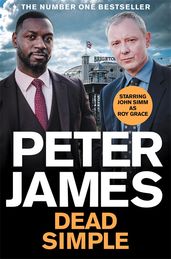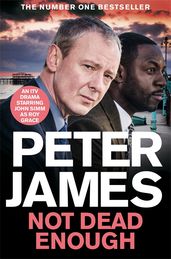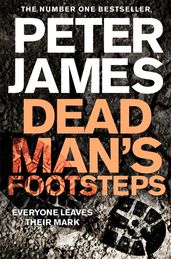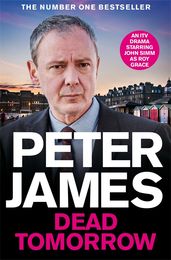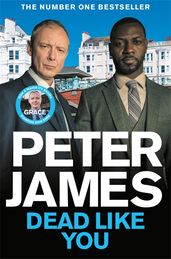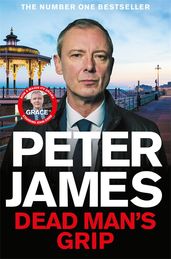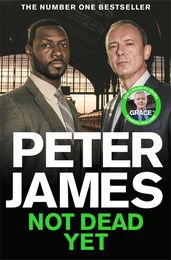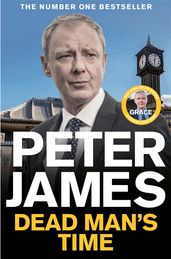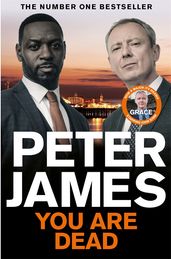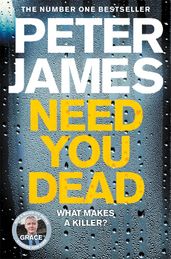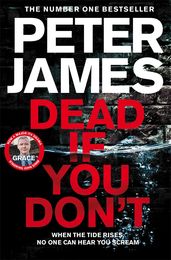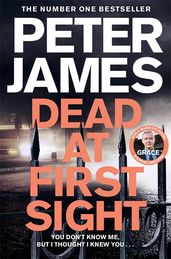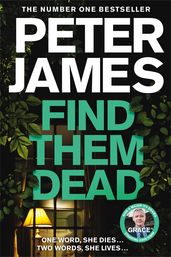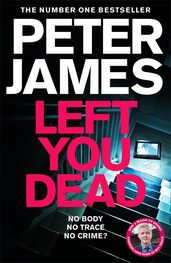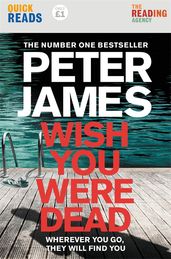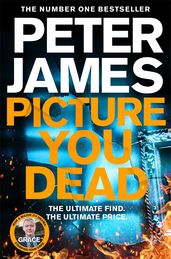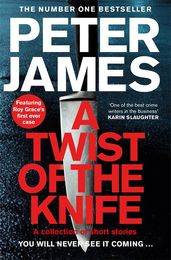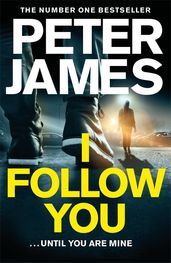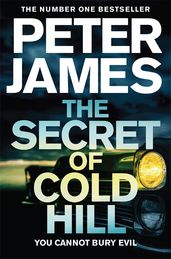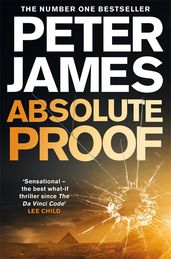Peter James's bestselling Roy Grace books in order
All the books in Peter James's Brighton-set DSI Roy Grace series in order of publication.
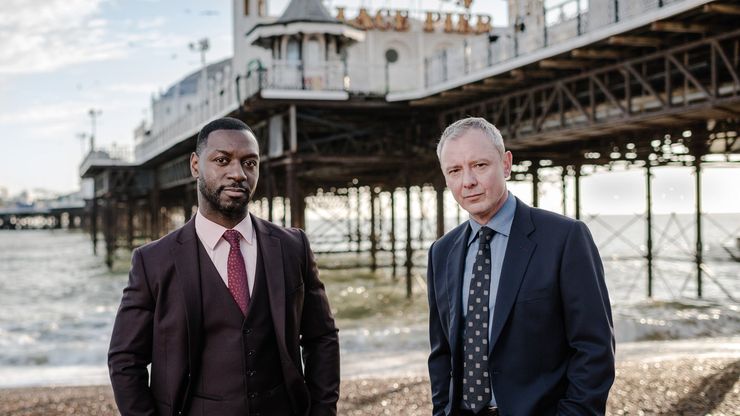
Peter James's bestselling Roy Grace series has been translated into thirty-seven languages, with sales worldwide of over eighteen million copies.
A crime fiction phenomenon, the series has also been adapted for the small screen in ITV's Grace, starring John Simm as Detective Superintendent Roy Grace and Richie Campbell as Detective Sergeant Glen Branson. Season five was broadcast in April 2025.
Read on for all of Peter James's Roy Grace books in order.
What is the latest book in Peter James's Roy Grace series?
The Hawk Is Dead
by Peter James
Roy Grace would never have believed that a murder investigation would take him into Buckingham Palace. Her Majesty, Queen Camilla, is aboard the Royal Train heading to a charity event in Sussex when disaster strikes – the train is derailed, and a trusted aide is killed by a sniper. Grace alone is not convinced The Queen was the intended target – but no-one else agrees. Fighting against the scepticism of his colleagues and the Palace itself, Grace pursues his own investigation. But when there is a second murder, the stakes rise even higher, and Grace is at risk of being embroiled in a very public catastrophe – and in mortal danger.
The Roy Grace series book in order
Dead Simple
by Peter James
Book one
Four friends agree to pull a prank on their soon-to-be-married mate, Michael Harrison. But what begins as a harmless joke turns into a nightmare when the friends die in a car crash, leaving Michael buried alive in a coffin with no way out. Detective Superintendent Roy Grace is tasked with solving the mystery, but with no leads and no witnesses, Michael’s time is running out. Fast-paced and full of twists, Dead Simple is the first book in Peter James's gripping Roy Grace series.
Looking Good Dead
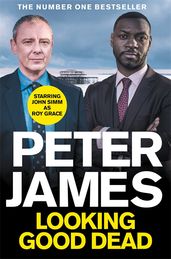
Book two
Tom Bryce did what any decent person would do. But within hours of picking up the CD that had been left behind on the train seat next to him, and attempting to return it to its owner, he is the sole witness to a vicious murder. Supported by his wife, Kellie, he bravely makes a statement to the murder enquiry team headed by Detective Superintendent Roy Grace. And from that moment the killing of the Bryce family becomes a mere formality. Notice of Kellie and Tom’s deaths has already been posted on the internet. You can log on and see them on a website. They are looking good dead.
Not Dead Enough
by Peter James
Book three
On the night Brian Bishop murdered his wife he was sixty miles away, asleep in bed at the time. At least that’s the way it looks to Detective Superintendent Roy Grace, who is called in to investigate the kinky slaying of beautiful socialite, Katie Bishop. Roy Grace soon starts coming to the conclusion that Bishop has performed the apparently impossible feat of being in two places at once. Has someone stolen his identity or is he simply a very clever liar?
Dead Man's Footsteps
by Peter James
Book four
Amid the tragic unfolding mayhem of the morning of 9/11, failed Brighton businessman and ne’er-do-well Ronnie Wilson sees the chance of a lifeline: to shed his debts, disappear and reinvent himself in another country. Six years later the discovery of the skeletal remains of a woman’s body in a storm drain in Brighton leads Detective Superintendent Roy Grace on an enquiry spanning the globe, and into a desperate race against time to save the life of a woman being hunted down like an animal in the streets and alleys of the city of Brighton.
Dead Tomorrow
by Peter James
Book five
The body of a missing teenager is dredged from the seabed off the Sussex coast, missing vital organs. Soon after, a further two more bodies are found. As Detective Superintendent Roy Grace investigates the recovered bodies, he unearths the trail of a gang of child traffickers operating from Eastern Europe. Soon Grace and his team will find themselves in a race against time to save the life of a young street kid, while a desperate mother will stop at nothing to save her daughter’s life.
Dead Like You
by Peter James
Book six
The Metropole Hotel, Brighton. After a heady New Year’s Eve ball, a woman is brutally raped as she returns to her room. A week later, another woman is attacked. Both victims’ shoes are taken by the offender. Detective Superintendent Roy Grace soon realizes that these new cases bear remarkable similarities to an unsolved series of crimes in the city back in 1997. The perpetrator had been dubbed ‘Shoe Man’ and was believed to have raped five women before murdering his sixth victim and vanishing. Could this be a copycat, or has Shoe Man resurfaced?
Dead Man's Grip
by Peter James
Book seven
Carly Chase is still traumatised after being in a fatal traffic accident which kills a teenage student from Brighton University. Then she receives news that turns her entire world into a living nightmare. The drivers of the other two vehicles involved have been found tortured and murdered. Now Detective Superintendant Roy Grace of the Sussex Police force issues a stark and urgent warning to Carly: She could be next. Already the killer is one step ahead of her, watching, waiting, and ready.
Not Dead Yet
by Peter James
Book eight
For LA producer Larry Brooker, this is the movie that could bring the fortune that has so long eluded him. For rock superstar, Gaia, this is the role that could get her an Oscar nomination. For the City of Brighton and Hove, the publicity value of a major Hollywood movie being filmed on location is incalculable. For Detective Superintendent Roy Grace of Sussex CID, it is a nightmare unfolding in front of his eyes. An obsessed stalker is after Gaia. One attempt on her life is made days before she flies to Brighton. Now, he has been warned, the stalker may be at large in his city.
Dead Man's Time
by Peter James
Book nine
A vicious robbery at a secluded Brighton mansion leaves its elderly occupant dying. Millions of pounds’ worth of valuables have been stolen. But as Detective Superintendent Roy Grace, heading the enquiry, rapidly learns, there is one priceless item of sentimental value that her powerful family cherish above all else. And they are fully prepared to take the law into their own hands, and will do anything to get it back. Within days, Grace is racing against the clock, chasing a killer driven by the force of one man’s greed and another man’s fury.
‘‘Peter James has penetrated the inner workings of police procedures, and the inner thoughts and attitudes of real detectives, as no English crime writer before him'’
— The Times
Want You Dead
by Peter James
Book ten
When Red Westwood meets handsome, charming and rich Bryce Laurent through an online dating agency, there is an instant attraction. But as their love blossoms, the truth about his past, and his dark side, begins to emerge. Everything he has told Red about himself turns out to be a tissue of lies, and her infatuation with him gradually turns to terror. Within a year, and under police protection, she evicts him from her flat and her life. But Red’s nightmare is only just beginning. For Bryce is obsessed with her, and he intends to destroy everything and everyone she has ever known and loved - and then her too.
You Are Dead
by Peter James
Book eleven
When a series of women with long brown hair are abducted and found with a chilling brand, 'U R Dead', Detective Superintendent Roy Grace is thrust into his most disturbing case yet. Then, Logan Somerville vanishes while speaking to her fiancé on the phone and Grace uncovers a terrifying link between her disappearance and a string of victims stretching back decades. With each grim discovery, Grace races against time to stop a killer who has eluded capture for thirty years.
Love You Dead
by Peter James
Book twelve
An ugly duckling as a child, Jodie Bentley had two dreams in life – to be beautiful and rich. She’s achieved the first, with a little help from a plastic surgeon, and now she’s working hard on the second. Her philosophy on money is simple: you can either earn it or marry it. Marrying is easy, it’s getting rid of the husband afterwards that’s harder, that takes real skill. But hey, practice makes perfect. Roy Grace believes a Black Widow is operating in his city. One with a venomous mind and venomous skills. Soon Grace comes to the frightening realization that he may have underestimated just how dangerous this lady is.
Need You Dead
by Peter James
Book thirteen
Lorna Belling’s life takes a dark turn when she becomes trapped in an abusive relationship and falls for a man who promises her a way out. But when her plans to escape unravel, Lorna is found dead, and Detective Superintendent Roy Grace is called in to investigate. As Grace digs deeper into Lorna’s life, he uncovers a tangled web of lies, secrets, and betrayal, with multiple suspects and motives emerging. In a race against time, Grace must untangle the truth before the killer strikes again.
Dead If You Don't
by Peter James
Book fourteen
Kipp Brown, successful businessman and compulsive gambler, is having the worst run of luck of his life. He’s beginning to lose big style. He takes his teenage son, Mungo, to their club’s big Saturday afternoon football match but within minutes of arriving at the game, Kipp bumps into a client. He takes his eye of Mungo for a few moments, and in that time, the boy is gone. Then he gets the terrifying message that someone has his child, and to get him back alive, Kipp will have to pay. Defying instruction not to contact the police, Kipp reluctantly does just that, and Detective Superintendent Roy Grace is brought into investigate.
Dead at First Sight
by Peter James
Book fifteen
Detective Superintendent Roy Grace is plunged into a chilling case of betrayal and murder when a wealthy businessman falls victim to an elaborate online dating scam. What starts as a simple con spirals into something far darker as Grace uncovers a global network of ruthless criminals targeting vulnerable victims. With lives at stake and the criminals always one step ahead, Grace must navigate a world of lies and deceit to bring the killers to justice. Can he bring down the murderous global empire built on clever, cruel internet scams?
Find Them Dead
by Peter James
Book sixteen
Roy Grace gets a tip-off about a county lines drug operation working out of Brighton, and and then is called to a seemingly senseless murder. Meanwhile, Meg Magellan can't help worrying about her daughter who is on a gap year in South America, so when she gets called up for jury service it seems like a welcome distraction. But the trial is for a major Brighton drugs overlord, and a few days into the trial everything changes when Meg gets a terrifying phone call – ensure the trial ends with a not guilty verdict – or she'll never see her daughter again.
Left You Dead
by Peter James
Book seventeen
Niall and Eden Paternoster start their Sunday the same way they always do – with a long drive, a visit to a country house and a quick stop at the local supermarket on the way home. But this Sunday ends differently – because while Niall waits and waits in the car park for Eden to pick up supplies, Eden never returns. She’s not waiting for him at home, and none of their family or friends have heard from her. Gone without a trace, Niall is arrested on suspicion of her murder. When DS Roy Grace is called in to investigate, it doesn’t take long to realize that nothing is quite as it seems – and this might be his most mysterious case yet.
Wish You Were Dead: Quick Reads 2021
by Peter James
Wish You Were Dead is a Quick Read short story from bestselling author Peter James.
Roy Grace and his family have left Sussex behind for a week’s holiday in France. The website promised a grand house, but when they arrive the place is very different from the pictures. And it soon becomes clear that their holiday nightmare is only just beginning. An old enemy of Roy, a lowlife criminal he had put behind bars, is now out of jail – and out for revenge. He knows where Roy and his family have gone on holiday. Of course he does. He’s been hacking their emails – and they are in the perfect spot for him to pay Roy back.
Picture You Dead
by Peter James
Book eighteen
When Harry and Freya stumble upon a rare painting at a car boot sale, they believe they’ve found a hidden masterpiece that could change their lives forever. But as they dig deeper into the artwork’s mysterious past, they soon realise they’re not the only ones after it. A dangerous figure lurks in the shadows, willing to stop at nothing to claim the treasure for themselves. As the stakes grow higher, Harry and Freya are thrust into a deadly game of cat and mouse . . .
Stop Them Dead
by Peter James
Book nineteen
In the darkness, a farmer confronts intruders, unaware of the brutal outcome that awaits him. As Detective Superintendent Roy Grace arrives at the crime scene, he senses a deeper conspiracy than a mere break-in. Ruthless gangs, operating with military precision, have discovered a new black market flourishing in the shadows – an unthinkable source of wealth even more profitable than drugs. Grace's pursuit of justice leads him into a deadly game against merciless people who stop at nothing to protect their ill-gotten wealth. With time running out, Grace must defy the odds and halt these criminal masterminds.
They Thought I Was Dead: Sandy's Story
by Peter James
Whether you've read the Roy Grace series or are looking for your next page-turning standalone read, They Thought I Was Dead will thrill fans and new readers alike with its gripping story of a woman on the run.
Her name is Sandy. She is the loving wife of Detective Superintendent Roy Grace, but there's more to her than meets the eye. After her disappearance sparked a nationwide search, even the best detective on the force couldn't find her. They thought she was dead, but what would cause a woman to leave her whole life behind and simply vanish? For the first time, the number one, multi-million copy bestselling author Peter James reveals the truth behind Sandy Grace’s dramatic disappearance.
One of Us is Dead

When James Taylor arrives late for a funeral, he has to stand at the back of the small church. But, as the service progresses, Taylor notices a man six rows in front of him. At first he thinks he must be mistaken, but the more he looks at the man, the more convinced Taylor becomes that this is his old schoolfriend Rufus Rorke. But he died two years ago. . . Meanwhile, Detective Superintendent Roy Grace has been alerted to a number of suspicious deaths that he can’t get out of his mind. But how are they linked? And could they possibly be connected to Rufus Rorke?
There's no one better to introduce Roy Grace than Peter James himself – here's everything you need to know about the series in one video:
If you're a fan of Peter James's Roy Grace books, then you'll also love his other page-turning novels and short story collections:
A Twist of the Knife
by Peter James
With each twist of the knife, a chilling new journey begins . . . From a woman intent on bizarre revenge to a restaurant critic with a morbid fear of the number thirteen, and from a man arranging a life-changing assignation to a couple heading for a disaster-filled vacation . . .
A Twist of the Knife is Peter James’s gripping first full-length collection of short stories, including the novellas The Perfect Murder, Footloose written with Val McDermid and In The Nick of Time written with Ian Rankin.
I Follow You
by Peter James
This nerve-shredding standalone thriller book is a must-read for fans of Peter James. Marcus Valentine seems like he has it all. He’s a suave, charming and confident doctor with a happy family. But something, or someone, has always been missing. Then one day, he narrowly misses hitting a jogger with his car. As she runs off, he’s sure that she’s a girl from his past. A girl he’s never been able to forget. As he is consumed by his obsession with her, events take a tragic turn.
The House on Cold Hill
by Peter James
The House on Cold Hill is a chilling ghost story full of suspense. The Harcourts decide to make a big life change, moving from th entre of Brighton to an old Georgian mansion in the depths of the Sussex countryside. Ollie is sure this is the right move for his family, but his wife and twelve-year-old daughter aren’t convinced. And within days of moving in, it’s clear that the Harcourts aren’t the only residents of the house . . .
Perfect People
by Peter James
Perfect People is a compelling and thought-provoking thriller from bestselling author Peter James. John and Naomi Klaesson are grieving the death of their four-year-old son from a rare genetic disorder. They desperately want another child, but when they find out they are both carriers of a rogue gene, they realize the odds of their next child contracting the disease are high. Then they hear about geneticist Doctor Leo Dettore. He has methods that can spare them the heartache of ever losing another child to any disease – even if his methods cost more than they can afford. His clinic is where their nightmare begins.
The Secret of Cold Hill
by Peter James
Cold Hill House was burned to the ground, and with it, all the terrible memories of the house’s violent history went up in smoke. Now an ultra-modern housing development has been built on the site, and despite the ongoing construction work, the first two families to move in are certain they’ve found their dream homes. But there was one thing the estate agents didn’t mention; nobody in Cold Hill House ever survived beyond forty . . .
Absolute Proof
by Peter James
Investigative reporter Ross Hunter answers the phone to a man who swears he’s found absolute proof of God’s existence – and he wants Ross’s help in convincing the world. What would it take to prove the existence of God? And can Ross Hunter survive long enough to find out? This explosive thriller will keep you gripped to the very last page.

